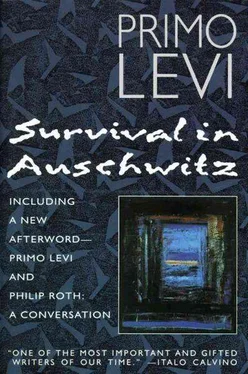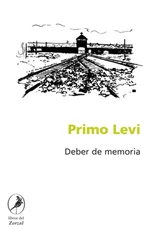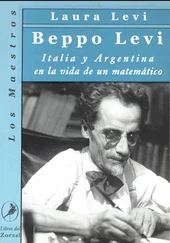Now another German comes and tells us to put the shoes in a certain comer, and we put them there, because now it is all over and we feel outside this world and the only thing is to obey. Someone comes with a broom and sweeps away all the shoes, outside the door in a heap. He is crazy, he is mixing them all together, ninety-six pairs, they will be all unmatched. The outside door opens, a freezing wind enters and we are naked and cover ourselves up with our arms. The wind blows and slams the door; the German reopens it and stands watching with interest how we writhe to hide from the wind, one behind the other. Then he leaves and closes it.
Now the second act begins. Four men with razors, soap-brushes and clippers burst in; they have trousers and jackets with stripes, with a number sewn on the front; perhaps they are the same sort as those others of this evening (this evening or yesterday evening?); but these are robust and flourishing. We ask many questions but they catch hold of us and in a moment we find ourselves shaved and sheared. What comic faces we have without hair! The four speak a language which does not seem of this world. It is certainly not German, for I understand a little German.
Finally another door is opened: here we are, locked in, naked, sheared and standing, with our feet in water — it is a shower-room. We are alone. Slowly the astonishment dissolves, and we speak, and everyone asks questions and no one answers. If we are naked in a shower-room, it means that we will have a shower. If we have a shower it is because they are not going to kill us yet. But why then do they keep us standing, and give us nothing to drink, while nobody explains anything, and we have no shoes or clothes, but we are all naked with our feet in the water, and we have been travelling five days and cannot even sit down.
And our women?
Mr Levi asks me if I think that our women are like us at this moment, and where they are, and if we will be able to see them again. I say yes, because he is married and has a daughter; certainly we will see them again. But by now my belief is that all this is a game to mock and sneer at us. Clearly they will kill us, whoever thinks he is going to live is mad, it means that he has swallowed the bait, but I have not; I have understood that it will soon all be over, perhaps in this same room, when they get bored of seeing us naked, dancing from foot to foot and trying every now and again to sit down on the floor. But there are two inches of cold water and we cannot sit down.
We walk up and down without sense, and we talk, everybody talks to everybody else, we make a great noise. The door opens, and a German enters; it is the officer of before. He speaks briefly, the interpreter translates. ‘The officer says you must be quiet, because this is not a rabbinical school.’ One sees the words which are not his, the bad words, twist his mouth as they come out, as if he was spitting out a foul taste. We beg him to ask what we are waiting for, how long we will stay here, about our women, everything; but he says no, that he does not want to ask. This Flesch, who is most unwilling to translate into Italian the hard cold German phrases and refuses to turn into German our questions because he knows that it is useless, is a German Jew of about fifty, who has a large scar on his face from a wound received fighting the Italians on the Piave. He is a closed, taciturn man, for whom I feel an instinctive respect as I feel that he has begun to suffer before us.
The German goes and we remain silent, although we are a little ashamed of our silence. It is still night and we wonder if the day will ever come. The door opens again, and someone else dressed in stripes comes in. He is different from the others, older, with glasses, a more civilized face, and much less robust. He speaks to us in Italian.
By now we are tired of being amazed. We seem to be watching some mad play, one of those plays in which the witches, the Holy Spirit and the devil appear. He speaks Italian badly, with a strong foreign accent. He makes a long speech, is very polite, and tries to reply to all our questions.
We are at Monowitz, near Auschwitz, in Upper Silesia, a region inhabited by both Poles and Germans. This camp is a work-camp, in German one says Arbeitslager; all the prisoners (there are about ten thousand) work in a factory which produces a type of rubber called Buna, so that the camp itself is called Buna.
We will be given shoes and clothes — no, not our own — other shoes, other clothes, like his. We are naked now because we are waiting for the shower and the disinfection, which will take place immediately after the reveille, because one cannot enter the camp without being disinfected.
Certainly there will be work to do, everyone must work here. But there is work and work: he, for example, acts as doctor. He is a Hungarian doctor who studied in Italy and he is the dentist of the Lager. He has been in the Lager for four and a half years (not in this one: Buna has only been open for a year and a half), but we can see that he is still quite well, not very thin. Why is he in the Lager? Is he Jewish like us? ‘No,’ he says simply, ‘I am a criminal.’
We ask him many questions. He laughs, replies to some and not to others, and it is clear that he avoids certain subjects. He does not speak of the women: he says they are well, that we will see them again soon, but he does not say how or where. Instead he tells us other things, strange and crazy things, perhaps he too is playing with us. Perhaps he is mad — one goes mad in the Lager. He says that every Sunday there are concerts and football matches. He says that whoever boxes well can become cook. He says that whoever works well receives prize-coupons with which to buy tobacco and soap. He says that the water is really not drinkable, and that instead a coffee substitute is distributed every day, but generally nobody drinks it as the soup itself is sufficiently watery to quench thirst. We beg him to find us something to drink, but he says he cannot, that he has come to see us secretly, against SS orders, as we still have to be disinfected, and that he must leave at once; he has come because he has a liking for Italians, and because, he says, he ‘has a little heart’. We ask him if there are other Italians in the camp and he says there are some, a few, he does not know how many; and he at once changes the subject. Meanwhile a bell rang and he immediately hurried off and left us stunned and disconcerted. Some feel refreshed but I do not. I still think that even this dentist, this incomprehensible person, wanted to amuse himself at our expense, and I do not want to believe a word of what he said.
At the sound of the bell, we can hear the still dark camp waking up. Unexpectedly the water gushes out boiling from the showers — five minutes of bliss; but immediately after, four men (perhaps they are the barbers) burst in yelling and shoving and drive us out, wet and steaming, into the adjoining room which is freezing; here other shouting people throw at us unrecognizable rags and thrust into our hands a pair of broken-down boots with wooden soles; we have no time to understand and we already find ourselves in the open, in the blue and icy snow of dawn, barefoot and naked, with all our clothing in our hands, with a hundred yards to run to the next hut. There we are finally allowed to get dressed.
When we finish, everyone remains in his own corner and we do not dare lift our eyes to look at one another. There is nowhere to look in a mirror, but our appearance stands in front of us, reflected in a hundred livid faces, in a hundred miserable and sordid puppets. We are transformed into the phantoms glimpsed yesterday evening.
Then for the first time we became aware that our language lacks words to express this offence, the demolition of a man. In a moment, with almost prophetic intuition, the reality was revealed to us: we had reached the bottom. It is not possible to sink lower than this; no human condition is more miserable than this, nor could it conceivably be so. Nothing belongs to us any more; they have taken away our clothes, our shoes, even our hair; if we speak, they will not listen to us, and if they listen, they will not understand. They will even take away our name: and if we want to keep it, we will have to find ourselves the strength to do so, to manage somehow so that behind the name something of us, of us as we were, still remains.
Читать дальше












